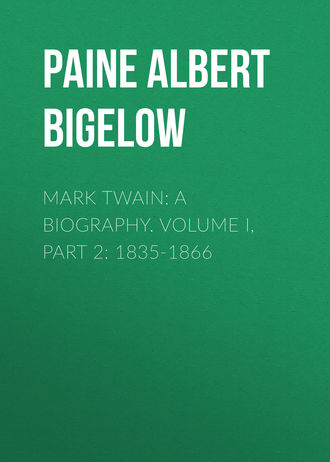 полная версия
полная версияMark Twain: A Biography. Volume I, Part 2: 1835-1866

Albert Bigelow Paine
Mark Twain: A Biography. Volume I, Part 2: 1835-1866
VOLUME I, Part 2: 1866-1875
LIV
THE LECTURER
It was not easy to take up the daily struggle again, but it was necessary.—[Clemens once declared he had been so blue at this period that one morning he put a loaded pistol to his head, but found he lacked courage to pull the trigger.]—Out of the ruck of possibilities (his brain always thronged with plans) he constructed three or four resolves. The chief of these was the trip around the world; but that lay months ahead, and in the mean time ways and means must be provided. Another intention was to finish the Hornet article, and forward it to Harper's Magazine—a purpose carried immediately into effect. To his delight the article found acceptance, and he looked forward to the day of its publication as the beginning of a real career. He intended to follow it up with a series on the islands, which in due time might result in a book and an income. He had gone so far as to experiment with a dedication for the book—an inscription to his mother, modified later for use in 'The Innocents Abroad'. A third plan of action was to take advantage of the popularity of the Hawaiian letters, and deliver a lecture on the same subject. But this was a fearsome prospect—he trembled when he thought of it. As Governor of the Third House he had been extravagantly received and applauded, but in that case the position of public entertainer had been thrust upon him. To come forward now, offering himself in the same capacity, was a different matter. He believed he could entertain, but he lacked the courage to declare himself; besides, it meant a risk of his slender capital. He confided his situation to Col. John McComb, of the Alta California, and was startled by McComb's vigorous endorsement.
"Do it, by all means!" urged McComb. "It will be a grand success—I know it! Take the largest house in town, and charge a dollar a ticket."
Frightened but resolute, he went to the leading theater manager the same Tom Maguire of his verses—and was offered the new opera-house at half rates. The next day this advertisement appeared:
MAGUIRE'S ACADEMY OF MUSIC PINE STREET, NEAR MONTGOMERYTHE SANDWICH ISLANDSMARK TWAIN(HONOLULU CORRESPONDENT OF THE SACRAMENTO UNION) WILL DELIVER A LECTURE ON THE SANDWICH ISLANDSAT THE ACADEMY OF MUSICON TUESDAY EVENING, OCT. 2d(1866)In which passing mention will be made of Harris, Bishop Staley, theAmerican missionaries, etc., and the absurd customs and characteristicsof the natives duly discussed and described. The great volcano ofKilauea will also receive proper attentionA SPLENDID ORCHESTRAis in town, but has not been engagedALSOA DEN OF FEROCIOUS WILD BEASTSwill be on exhibition in the next blockMAGNIFICENT FIREWORKSwere in contemplation for this occasion, but the idea has been abandonedA GRAND TORCHLIGHT PROCESSIONmay be expected; in fact, the public are privileged to expect whateverthey pleaseDress Circle, $1.00 Family Circle, 50cDoors open at 7 o'clock The Trouble to begin at 8 o'clockThe story of that first lecture, as told in Roughing It, is a faithful one, and need only be summarized here.
Expecting to find the house empty, he found it packed from the footlights to the walls. Sidling out from the wings—wobbly-kneed and dry of tongue—he was greeted by a murmur, a roar, a very crash of applause that frightened away his remaining vestiges of courage. Then, came reaction —these were his friends, and he began to talk to them. Fear melted away, and as tide after tide of applause rose and billowed and came breaking at his feet, he knew something of the exaltation of Monte Cristo when he declared "The world is mine!"
It was a vast satisfaction to have succeeded. It was particularly gratifying at this time, for he dreaded going back into newspaper harness. Also; it softened later the disappointment resulting from another venture; for when the December Harper appeared, with his article, the printer and proof-reader had somehow converted Mark Twain into "Mark Swain," and his literary dream perished.
As to the literary value of his lecture, it was much higher than had, been any portion of his letters, if we may judge from its few remaining fragments. One of these—a part of the description of the great volcano Haleakala, on the island of Maui—is a fair example of his eloquence.
It is somewhat more florid than his later description of the same scene in Roughing It, which it otherwise resembles; and we may imagine that its poetry, with the added charm of its delivery, held breathless his hearers, many of whom believed that no purer eloquence had ever been uttered or written.
It is worth remembering, too, that in this lecture, delivered so long ago, he advocated the idea of American ownership of these islands, dwelling at considerable length on his reasons for this ideal.
–[For fragmentary extracts from this first lecture of Mark Twain and news comment, see Appendix D, end of last volume.]—There was a gross return from his venture of more than $1,200, but with his usual business insight, which was never foresight, he had made an arrangement by which, after paying bills and dividing with his manager, he had only about one-third of, this sum left. Still, even this was prosperity and triumph. He had acquired a new and lucrative profession at a bound. The papers lauded him as the "most piquant and humorous writer and lecturer on the Coast since the days of the lamented John Phoenix." He felt that he was on the highroad at last.
Denis McCarthy, late of the Enterprise, was in San Francisco, and was willing to become his manager. Denis was capable and honest, and Clemens was fond of him. They planned a tour of the near-by towns, beginning with Sacramento, extending it later even to the mining camps, such as Red Dog and Grass Valley; also across into Nevada, with engagements at Carson City, Virginia, and Gold Hill. It was an exultant and hilarious excursion—that first lecture tour made by Denis McCarthy and Mark Twain. Success traveled with them everywhere, whether the lecturer looked across the footlights of some pretentious "opera-house" or between the two tallow candles of some camp "academy." Whatever the building, it was packed, and the returns were maximum.
Those who remember him as a lecturer in that long-ago time say that his delivery was more quaint, his drawl more exaggerated, even than in later life; that his appearance and movements on the stage were natural, rather than graceful; that his manuscript, which he carried under his arm, looked like a ruffled hen. It was, in fact, originally written on sheets of manila paper, in large characters, so that it could be read easily by dim light, and it was doubtless often disordered.
There was plenty of amusing experience on this tour. At one place, when the lecture was over, an old man came to him and said:
"Be them your natural tones of eloquence?"
At Grass Valley there was a rival show, consisting of a lady tight-rope walker and her husband. It was a small place, and the tight-rope attraction seemed likely to fail. The lady's husband had formerly been a compositor on the Enterprise, so that he felt there was a bond of brotherhood between him and Mark Twain.
"Look here," he said. "Let's combine our shows. I'll let my wife do the tight-rope act outside and draw a crowd, and you go inside and lecture."
The arrangement was not made.
Following custom, the lecturer at first thought it necessary to be introduced, and at each place McCarthy had to skirmish around and find the proper person. At Red Dog, on the Stanislaus, the man selected failed to appear, and Denis had to provide another on short notice. He went down into the audience and captured an old fellow, who ducked and dodged but could not escape. Denis led him to the stage, a good deal frightened.
"Ladies and gentlemen," he said, "this is the celebrated Mark Twain from the celebrated city of San Francisco, with his celebrated lecture about the celebrated Sandwich Islands."
That was as far as he could go; but it was far enough. Mark Twain never had a better introduction. The audience was in a shouting humor from the start.
Clemens himself used to tell of an introduction at another camp, where his sponsor said:
"Ladies and gentlemen, I know only two things about this man: the first is that he's never been in jail, and the second is I don't know why."
But this is probably apocryphal; there is too much "Mark Twain" in it.
When he reached Virginia, Goodman said to him:
"Sam, you do not need anybody to introduce you. There's a piano on the stage in the theater. Have it brought out in sight, and when the curtain rises you be seated at the piano, playing and singing that song of yours, 'I Had an Old Horse Whose Name Was Methusalem,' and don't seem to notice that the curtain is up at first; then be surprised when you suddenly find out that it is up, and begin talking, without any further preliminaries."
This proved good advice, and the lecture, thus opened, started off with general hilarity and applause.
LV
HIGHWAY ROBBERY
His Nevada, lectures were bound to be immensely successful. The people regarded him as their property over there, and at Carson and Virginia the houses overflowed. At Virginia especially his friends urged and begged him to repeat the entertainment, but he resolutely declined.
"I have only one lecture yet," he said. "I cannot bring myself to give it twice in the same town."
But that irresponsible imp, Steve Gillis, who was again in Virginia, conceived a plan which would make it not only necessary for him to lecture again, but would supply him with a subject. Steve's plan was very simple: it was to relieve the lecturer of his funds by a friendly highway robbery, and let an account of the adventure furnish the new lecture.
In 'Roughing It' Mark Twain has given a version of this mock robbery which is correct enough as far as it goes; but important details are lacking. Only a few years ago (it was April, 1907), in his cabin on jackass Hill, with Joseph Goodman and the writer of this history present, Steve Gillis made his "death-bed" confession as is here set down:
"Mark's lecture was given in Piper's Opera House, October 30, 1866. The Virginia City people had heard many famous lectures before, but they were mere sideshows compared with Mark's. It could have been run to crowded houses for a week. We begged him to give the common people a chance; but he refused to repeat himself. He was going down to Carson, and was coming back to talk in Gold Hill about a week later, and his agent, Denis McCarthy, and I laid a plan to have him robbed on the Divide between Gold Hill and Virginia, after the Gold Hill lecture was over and he and Denis would be coming home with the money. The Divide was a good lonely place, and was famous for its hold-ups. We got City Marshal George Birdsall into it with us, and took in Leslie Blackburn, Pat Holland, Jimmy Eddington, and one or two more of Sam's old friends. We all loved him, and would have fought for him in a moment. That's the kind of friends Mark had in Nevada. If he had any enemies I never heard of them.
"We didn't take in Dan de Quille, or Joe here, because Sam was Joe's guest, and we were afraid he would tell him. We didn't take in Dan because we wanted him to write it up as a genuine robbery and make a big sensation. That would pack the opera-house at two dollars a seat to hear Mark tell the story.
"Well, everything went off pretty well. About the time Mark was finishing his lecture in Gold Hill the robbers all went up on the Divide to wait, but Mark's audience gave him a kind of reception after his lecture, and we nearly froze to death up there before he came along. By and by I went back to see what was the matter. Sam and Denis were coming, and carrying a carpet-sack about half full of silver between them. I shadowed them and blew a policeman's whistle as a signal to the boys when the lecturers were within about a hundred yards of the place. I heard Sam say to Denis:
"'I'm glad they've got a policeman on the Divide. They never had one in my day.'
"Just about that time the boys, all with black masks on and silver dollars at the sides of their tongues to disguise their voices, stepped out and stuck six-shooters at Sam and Denis and told them to put up their hands. The robbers called each other 'Beauregard' and 'Stonewall Jackson.' Of course Denis's hands went up, and Mark's, too, though Mark wasn't a bit scared or excited. He talked to the robbers in his regular fashion. He said:
"'Don't flourish those pistols so promiscuously. They might go off by accident.'
"They told him to hand over his watch and money; but when he started to take his hands down they made him put them up again. Then he asked how they expected him to give them his valuables with his hands up in the sky. He said his treasures didn't lie in heaven. He told them not to take his watch, which was the one Sandy Baldwin and Theodore Winters had given him as Governor of the Third House, but we took it all the same.
"Whenever he started to put his hands down we made him put them up again.
Once he said:
"'Don't you fellows be so rough. I was tenderly reared.'
"Then we told him and Denis to keep their hands up for fifteen minutes after we were gone—this was to give us time to get back to Virginia and be settled when they came along. As we were going away Mark called:
"'Say, you forgot something.'
"'What is it?'
"Why, the carpet-bag.'
"He was cool all the time. Senator Bill Stewart, in his Autobiography, tells a great story of how scared Mark was, and how he ran; but Stewart was three thousand miles from Virginia by that time, and later got mad at Mark because he made a joke about him in 'Roughing It'.
"Denis wanted to take his hands down pretty soon after we were gone, but Mark said:
"'No, Denis, I'm used to obeying orders when they are given in that convincing way; we'll just keep our hands up another fifteen minutes or so for good measure.'
"We were waiting in a big saloon on C Street when Mark and Denis came along. We knew they would come in, and we expected Mark would be excited; but he was as unruffled as a mountain lake. He told us they had been robbed, and asked me if I had any money. I gave him a hundred dollars of his own money, and he ordered refreshments for everybody. Then we adjourned to the Enterprise office, where he offered a reward, and Dan de Quille wrote up the story and telegraphed it to the other newspapers. Then somebody suggested that Mark would have to give another lecture now, and that the robbery would make a great subject. He entered right into the thing, and next day we engaged Piper's Opera House, and people were offering five dollars apiece for front seats. It would have been the biggest thing that ever came to Virginia if it had come off. But we made a mistake, then, by taking Sandy Baldwin into the joke. We took in Joe here, too, and gave him the watch and money to keep, which made it hard for Joe afterward. But it was Sandy Baldwin that ruined us. He had Mark out to dinner the night before the show was to come off, and after he got well warmed up with champagne he thought it would be a smart thing to let Mark into what was really going on.
"Mark didn't see it our way. He was mad clear through."
At this point Joseph Goodman took up the story. He said:
"Those devils put Sam's money, watch, keys, pencils, and all his things into my hands. I felt particularly mean at being made accessory to the crime, especially as Sam was my guest, and I had grave doubts as to how he would take it when he found out the robbery was not genuine.
"I felt terribly guilty when he said:
"'Joe, those d—n thieves took my keys, and I can't get into my trunk. Do you suppose you could get me a key that would fit my trunk?'
"I said I thought I could during the day, and after Sam had gone I took his own key, put it in the fire and burnt it to make it look black. Then I took a file and scratched it here and there, to make it look as if I had been fitting it to the lock, feeling guilty all the time, like a man who is trying to hide a murder. Sam did not ask for his key that day, and that evening he was invited to judge Baldwin's to dinner. I thought he looked pretty silent and solemn when he came home; but he only said:
"'Joe, let's play cards; I don't feel sleepy.'
"Steve here, and two or three of the other boys who had been active in the robbery, were present, and they did not like Sam's manner, so they excused themselves and left him alone with me. We played a good while; then he said:
"'Joe, these cards are greasy. I have got some new ones in my trunk. Did you get that key to-day?'
"I fished out that burnt, scratched-up key with fear and trembling. But he didn't seem to notice it at all, and presently returned with the cards. Then we played, and played, and played—till one o'clock—two o'clock—Sam hardly saying a word, and I wondering what was going to happen. By and by he laid down his cards and looked at me, and said:
"'Joe, Sandy Baldwin told me all about that robbery to-night. Now, Joe, I have found out that the law doesn't recognize a joke, and I am going to send every one of those fellows to the penitentiary.'
"He said it with such solemn gravity, and such vindictiveness, that I believed he was in dead earnest.
"I know that I put in two hours of the hardest work I ever did, trying to talk him out of that resolution. I used all the arguments about the boys being his oldest friends; how they all loved him, and how the joke had been entirely for his own good; I pleaded with him, begged him to reconsider; I went and got his money and his watch and laid them on the table; but for a time it seemed hopeless. And I could imagine those fellows going behind the bars, and the sensation it would make in California; and just as I was about to give it up he said:
"'Well, Joe, I'll let it pass—this time; I'll forgive them again; I've had to do it so many times; but if I should see Denis McCarthy and Steve Gillis mounting the scaffold to-morrow, and I could save them by turning over my hand, I wouldn't do it!'
"He canceled the lecture engagement, however, next morning, and the day after left on the Pioneer Stage, by the way of Donner Lake, for California. The boys came rather sheepishly to see him off; but he would make no show of relenting. When they introduced themselves as Beauregard, Stonewall Jackson, etc., he merely said:
"'Yes, and you'll all be behind the bars some day. There's been a good deal of robbery around here lately, and it's pretty clear now who did it.' They handed him a package containing the masks which the robbers had worn. He received it in gloomy silence; but as the stage drove away he put his head out of the window, and after some pretty vigorous admonition resumed his old smile, and called out: 'Good-by, friends; good-by, thieves; I bear you no malice.' So the heaviest joke was on his tormentors after all."
This is the story of the famous Mark Twain robbery direct from headquarters. It has been garbled in so many ways that it seems worth setting down in full. Denis McCarthy, who joined him presently in San Francisco, received a little more punishment there.
"What kind of a trip did you boys have?" a friend asked of them.
Clemens, just recovering from a cold which the exposure on the Divide had given him, smiled grimly:
"Oh, pretty good, only Denis here mistook it for a spree."
He lectured again in San Francisco, this time telling the story of his Overland trip in 1861, and he did the daring thing of repeating three times the worn-out story of Horace Greeley's ride with Hank Monk, as given later in 'Roughing It'. People were deadly tired of that story out there, and when he told it the first time, with great seriousness, they thought he must be failing mentally. They did not laugh—they only felt sorry. He waited a little, as if expecting a laugh, and presently led around to it and told it again. The audience was astonished still more, and pitied him thoroughly. He seemed to be waiting pathetically in the dead silence for their applause, then went on with his lecture; but presently, with labored effort, struggled around to the old story again, and told it for the third time. The audience suddenly saw the joke then, and became vociferous and hysterical in their applause; but it was a narrow escape. He would have been hysterical himself if the relief had not came when it did.
–[A side-light on the Horace Greeley story and on Mr. Greeley's eccentricities is furnished by Mr. Goodman:
When I was going East in 1869 I happened to see Hank Monk just before I started. "Mr. Goodman," he said, "you tell Horace Greeley that I want to come East, and ask him to send me a pass." "All right, Hank," I said, "I will." It happened that when I got to New York City one of the first men I met was Greeley. "Mr. Greeley," said, "I have a message for you from Hank Monk." Greeley bristled and glared at me. "That—rascal?" he said, "He has done me more injury than any other man in America."]
LVI
BACK TO THE STATES
In the mean time Clemens had completed his plan for sailing, and had arranged with General McComb, of the Alta California, for letters during his proposed trip around the world. However, he meant to visit his people first, and his old home. He could go back with means now, and with the prestige of success.
"I sail to-morrow per Opposition—telegraphed you to-day," he wrote on December 14th, and a day later his note-book entry says:
Sailed from San Francisco in Opposition (line) steamer America, Capt. Wakeman, at noon, 15th Dec., 1866. Pleasant sunny day, hills brightly clad with green grass and shrubbery.
So he was really going home at last! He had been gone five and a half years—eventful, adventurous years that had made him over completely, at least so far as ambitions and equipment were concerned. He had came away, in his early manhood, a printer and a pilot, unknown outside of his class. He was returning a man of thirty-one, with a fund of hard experience, three added professions—mining, journalism, and lecturing —also with a new name, already famous on the sunset slopes of its adoption, and beginning to be heard over the hills and far away. In some degree, at least, he resembled the prince of a fairy tale who, starting out humble and unnoticed, wins his way through a hundred adventures and returns with gifts and honors.
The homeward voyage was a notable one. It began with a tempest a little way out of San Francisco—a storm terrible but brief, that brought the passengers from their berths to the deck, and for a time set them praying. Then there was Captain Ned Wakeman, a big, burly, fearless sailor, who had visited the edges of all continents and archipelagos; who had been born at sea, and never had a day's schooling in his life, but knew the Bible by heart; who was full of human nature and profanity, and believed he was the only man on the globe who knew the secret of the Bible miracles. He became a distinct personality in Mark Twain's work —the memory of him was an unfailing delight. Captain "Ned Blakely," in 'Roughing It', who with his own hands hanged Bill Noakes, after reading him promiscuous chapters from the Bible, was Captain Wakeman. Captain "Stormfield," who had the marvelous visit to heaven, was likewise Captain Wakeman; and he appears in the "Idle Excursion" and elsewhere.
Another event of the voyage was crossing the Nicaragua Isthmus—the trip across the lake and down the San Juan River—a brand-new experience, between shores of splendid tropic tangle, gleaming with vivid life. The luxuriance got into his note-book.
Dark grottos, fairy festoons, tunnels, temples, columns, pillars, towers, pilasters, terraces, pyramids, mounds, domes, walls, in endless confusion of vine-work—no shape known to architecture unimitated—and all so webbed together that short distances within are only gained by glimpses. Monkeys here and there; birds warbling; gorgeous plumaged birds on the wing; Paradise itself, the imperial realm of beauty-nothing to wish for to make it perfect.
But it was beyond the isthmus that the voyage loomed into proportions somber and terrible. The vessel they took there, the San Francisco, sailed from Greytown January 1, 1867, the beginning of a memorable year in Mark Twain's life. Next day two cases of Asiatic cholera were reported in the steerage. There had been a rumor of it in Nicaragua, but no one expected it on the ship.









